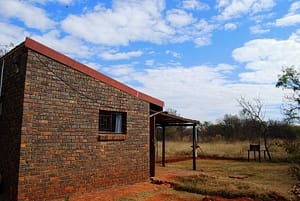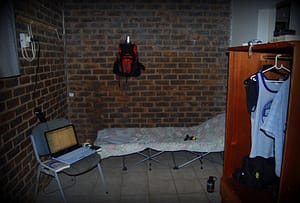Emperor in Exile
by Brian
 A man with a mustache and glasses is kneeling over his garden pulling weeds. He spots me and motions me over.
A man with a mustache and glasses is kneeling over his garden pulling weeds. He spots me and motions me over.
“You are that American, nay?” he says. “I heard you took the apartment in the back. My name is Wolf.”
“I’m Brian. Nice garden, Wolf.”
“Not bad, nay? It keeps me busy. And you? What are you doing in that damned tiny apartment all day? You know it used to be a horse stable.”
“I’m a writer.”
“A writer? Are you a beer drinker as well?”
“I am, but it’s a bit early for me.”
“For Germans there is no such thing as too early for beer. Sometimes, 9 o’clock in the morning. Come.”
Every writer is a hack. We plagiarize the collective unconscious.
I follow Wolf and have a seat at a green metal table. His two black and white terriers bark in alarm but after a cautionary sniff decide I’m no threat. Wolf returns with a quart of Amstel and two glasses.
“So you’re a writer?” says Wolf, filling the glasses.
When you tell somebody you’re a writer they expect that you have important things to say. But the truth is I’m a hack. Every writer is. None of us have ever had an original idea. We plagiarize the collective unconscious and pass it off as our own work.
“Have you been published?”
The question of whether you’ve been published is a polite way of asking for proof that you’re a writer.
“I’m working on a novel,” I say.
“Maybe I will be in it, nay? The crazy old German bastard and his Afrikaans wife!” says Wolf.
Yes, Wolf, you will be in the book. You’ll be portrayed as an excessively proud old German who retired young and whose subsequent boredom with life has driven him to alcoholism. I’ll explain how you want me to drink beer with you before noon because vices, like misery, love company.
I will inform the reader that you came to South Africa from Germany at the age of 18, speaking neither English nor Afrikaans, rented a cheap flat, got a job on an assembly line at a Mercedes plant, and worked your way up to the position of Branch Assembly Manager.
The reader will learn how your ambition and success allowed you to retire at the age of 50 and buy a game farm. And life was good on the farm. You lived a quiet life in the country and all was well until Apartheid ended and the blacks took over the government and reclaimed their ancestral lands—lands which your personal empire rested upon.
Wolf’s wife emerges from the house. She’s the kind of self-disparaging older woman who points out that she’s fat and ugly before you’ve had the chance to properly consider her appearance.
“Brian here is a writer,” says Wolf. “He’s going to put us into his book, be careful what you say around him!”
Yes…be very careful. I may be your friend now as I drink your beer but I’m taking notes. I’m noting, for example, how your wife seems uncomfortable with your thirst. I see in her eyes that she is unhappy. But it’s too late in life to back out of the situation. She’s stuck with you, you old drunken German bastard.
His life has collapsed under the weight of its own irony.
“Anna makes little things like this,” says Wolf, pointing to shells strung along pieces of fishing line draped over the brick walls around the back slider. There are also collages made of old bottles, pieces of metal, and other assorted items.
I will write that I like them, Wolf, drawing a comparison between her crafts and your drinking. They are what each of you turn to when faced with a waning life that is not all you hoped it would be.
“Wolfie, you’re going to get the gout if you start in with the beer this early!” says Anna.
“She doesn’t like all the drinking,” says Wolf. “Only one or two drinks every so often for her. I’m always telling her what fun it would be to drink together, but she doesn’t want to.”
With the midday African sun beating down on us we move inside. Wolf opens a fresh beer and refills our glasses.
“I could afford to live in a fancy place on the beach and drive an expensive car. But I don’t. You know why? Because I don’t like high society. Look in this freezer. Do you think we go hungry?”
He forces me to inspect his collection of frozen dead animals.
“But you are the other extreme. I don’t know how you live in that shack. I couldn’t do it. You’re lucky there’s a German around to take care of you.”
Wolf turns on the cricket match and puts his feet up.
“There is good opportunity in this country…cheap labor,” says Wolf.
“Start a business. You can be the boss, you pay some kaffirs nothing to do the work. You live like a king. It’s good to be a white man in South Africa.”
Says the self-proclaimed king who was driven from his castle by the servants. Wolf is one of those people whose life has collapsed under the weight of its own irony.
Minutes later Wolf is asleep, his mouth gaping open towards the ceiling, hand around his glass.
I drain the rest of the bottle into my glass and attempt to understand the cricket match. One of the terriers burrows into my lap.
Anna comes in carrying a load of wash to hang and sees her husband passed out.
“Already? I hope he didn’t bother you. He starts talking crap when he’s drunk.”
“Not at all. I enjoy his company.”
“Always with the beer. It didn’t used to be like this when we lived on the farm. Don’t get me wrong, he liked his beer. He is German. But not every day like this, drinking in the morning. Since we lost the farm he hasn’t been right.”
“I should go. I’ve got some things to do,” I say.
“Come back anytime. Don’t worry about him.”
“I’ll be back. Thank you.”
“His problem is he doesn’t keep busy enough. I keep busy making little things. I enjoy it.”
“Yes, we must keep busy,” I say. “Everyone needs something they enjoy making.”
